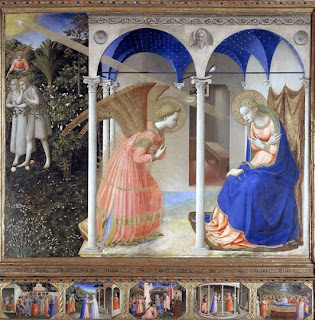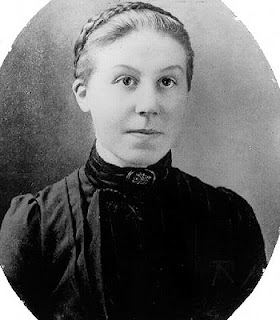We decided to visit around churches, and we did. We visited mostly Anglican congregations, but also visited the Trinity Uniting Church In the City for a couple of their special services during the year.
We also decided to take retreats. We did some at New Norcia - Lent, the Easter Triduum and Advent - and some conducted by the Dayspring Community in Mundaring - one a silent retreat and the other reflecting on the wisdom of the Desert Fathers.

We always felt that in conjunction with these retreats we took holiday weekends away which we did in Yallingup and Albany twice, each of which were times of renewal and life.

There is a litany in the Passover Seder that in the Hebrew is called Deyanu or "It would have been enough" in which the salvation history of the Exodus story is recounted and as each individual event is recalled - the pillar of smoke and fire, the manna, the water from the rock etc - the community recites Deyanu - it would have been enough. As I have recounted each of these things above, I feel like I could have said Deyanu - it would have been enough. "But wait!" as they say on TV. There was more.
I got to read lots of books this year - well lots for me, anyway. I read some new Crime Fiction, which is my favoured fiction genre, the most memorable "The Ritual Bath" by Faye Kellerman which gave some insight into a modern orthodox Jewish community. I also re-read many old favourites of the genre - Kerry Fisher's "Phryne Fisher Mysteries", Donna Leon's "Brunetti Novels" all set in Venice, and Andrea Camilleri's "Inspector Montalbano" Series set in Sicily. And I watched DVD episodes of "Nero Wolfe" and "Hercule Poirot" which, like the Phryne Fisher novels, were set in the Art Deco period of the first half of the 20th century.
But, perhaps more significantly I got to read some really good non-fiction - soul food of the best kind. I will outline them here and I trust that my potted version of each might arouse your interest to read something that you have not already read.
SABBATH - Dan B Allender
Our weekly Home Group has been practising Sabbath for over a year now - beginning our weekends with a Sundowner light meal, debriefing our weeks with each other and then engaging in a Lectio Divina Meditation followed by an Examen. Thus I found that I had already made the move that Dan was calling for - a move away from the idea of Sabbath as a REST to the idea of Sabbath as a CELEBRATION. The focus is on delighting in God through four elements - sensuality, ritual, communal feasting and playfulness. His is a call to experience Sabbath as a day in which you receive and extend reconciliation, peace, abundance and joy.
I MET GOD IN BERMUDA - Steven Ogden
In some ways this work by a colleague of my seminary days is rather heavy going. He is trying to engage with those moderns for whom traditional language about the faith is no longer meaningful. He takes as his beacon-lights the works of Karl Rahner and Paul Tillich with a focus on Incarnational spirituality - something that fits well with the existentialism of the current generation - "If it works for me then I am on that team." I liked it, my wife did not.
THE FIRST CHRISTMAS - Marcus J Borg & John D Crossan
This was the first of three of Borg's works that I read this year. I found that the historical parabolic herneutic that is introduced in this work has brought about a paradigm shift for me. It has given me a vocabulary for things I hadn't quite grasped because I did not have the vocab.
Two ideas stand out.
The Birth Narratives are Overtures of the whole Gospel that is to follow adds wonderful layers to the literary structure of the narrative; and
Parables as Subversive Stories that are challenging both the religious and socio-political structures of the day.
SOUL SURVIVOR - Philip Yancey
I read this book after my wife read it on our silent retreat. She found in it a framework for understanding and re-framing some of the struggles we went through in arriving at our Sabbatical year. What I found most interesting, apart from discovering the pain and anguish Yancey had struggled through in his quest for a faith that worked, was his ability to intertwine his own journey of faith development with the biographies or his working with the people who are the focus of each chapter - people like John Donne, Martin Luther King Jr, Dostoyevski, Ghandi, G K Chesterton and Henri Nouwen to name a few. The stories were inspirational in their own right, but when intertwined with Yancey's own faith journey they took on new layers of meaning.
MEETING JESUS AGAIN FOR THE FIRST TIME - Marcus J Borg
The Jesus Scholar's attempts to peel away the layers of theology and tradition found in the Biblical Narratives we now have is always going to ruffle some feathers, with accusations of 'watering down' and 'explaining away' vociferously shouted within conservative circles - "How we love our texts as they are."
Early on in this work, Borg provides a basic sketch of the Pre-Easter Jesus in which he says firstly it is impossible to ascertain whether Jesus thought of himself as the Messiah or Son of God. The Pre-Easter Jesus, he said, "pointed people away from himself to God". He also says that it is also unlikely that "Jesus expected the supernatural coming of the Kingdom of God as a world-ending event in his own generation."
He then goes on to identify four things we can actually say about the manner of Person this Pre-Easter Jesus was. He was a Spirit Person who demonstrated an experiential awareness of the reality of God. He was a Teacher of Wisdom, whose parables and aphorisms sought to teach an alternative and subversive wisdom. He was a Social Prophet along the lines and after the traditions of the prophets of ancient Israel. He was also, and undeniably, a Movement Founder seeking to renew and revitalize the Judaism of his day.
I found these ideas to be quite liberating as they enabled me to think of Jesus in much more realistic human terms, because so long as we add the gloss of divinity to the humanity of Jesus the Incarnation is diminished.
EUCHARIST WITH A SMALL 'e' - Miriam Therese Winter
A small tract really, although it runs into nearly 150 pages, but its central thesis is that the idea of EUCHARISTIC PRESENCE over which the Church has fought semantic battles for millenia should not focus on the bread and wine of the Eucharistic meal but rather on the gathered community. There is where the PRESENCE will be found. A very helpful contribution to the debate from a Catholic scholar.
THE NAKED NOW - Richard Rohr
I find Richard Rohr much more difficult to read than listen to. However, in this book he offers in a sense some reassurance - that the enlightenment so many are seeking in the West as they explore other religious traditions has been present in Christianity from the very beginning. It is obviously informed by the Franciscan and contemplative traditions that are part of Rohr's own life but it's genious, as a book is that Rohr includes some appendices that provide 8 practical exercises in exploring what he has been writing about.
THE HEART OF CHRISTIANITY - Marcus J Borg
Borg begins this book with a discussion of an earlier paradigm of Christianity that seems, somehow, to no longer satisfy many in the Church. As a way of addressing this he begins to articulate what he calls an "emerging paradigm" - one that is based on observation as much as theorising.
In some ways this has created a paradigm shift for me, but it is more likely the case that he has given me a systematic vocabulary for things I had already been thinking about. The chapters in the second part of the book were, for me, magnificent examples of reframing such big ideas as being Born Again, the Kingdom of God, Sin and Salvation and the place of Christianity in an age of pluralism.
ADULT FAITH - Diarmuid O'Murchu
My most recent adventure was with this book. As I spoke to colleagues at work, I sometimes referred to it as the latest bit of Heresy I was reading, because he makes some claims about life and faith and the church that are "right out there", so to speak. The idea that has struck me most profoundly is his assertion that the stability of our political and ecclesiastical systems is dependent on a kind of co-dependency by which the few people with real power are dependent on the passivity of the masses for them to retain it, and the masses have passively accepted that the elite few are really the best to do this stuff.
O'Murchu is writing a call to people of mature faith to beak down that co-dependency and live a faith that is authentic and free.
His chapters all open with a theme statement and conclude with a summary of the points addressed in the chapter - makes for easy reading.
So, that has been my year of theological reading. I hope that this inspires you to read a bit more and in areas that will feed your soul.













